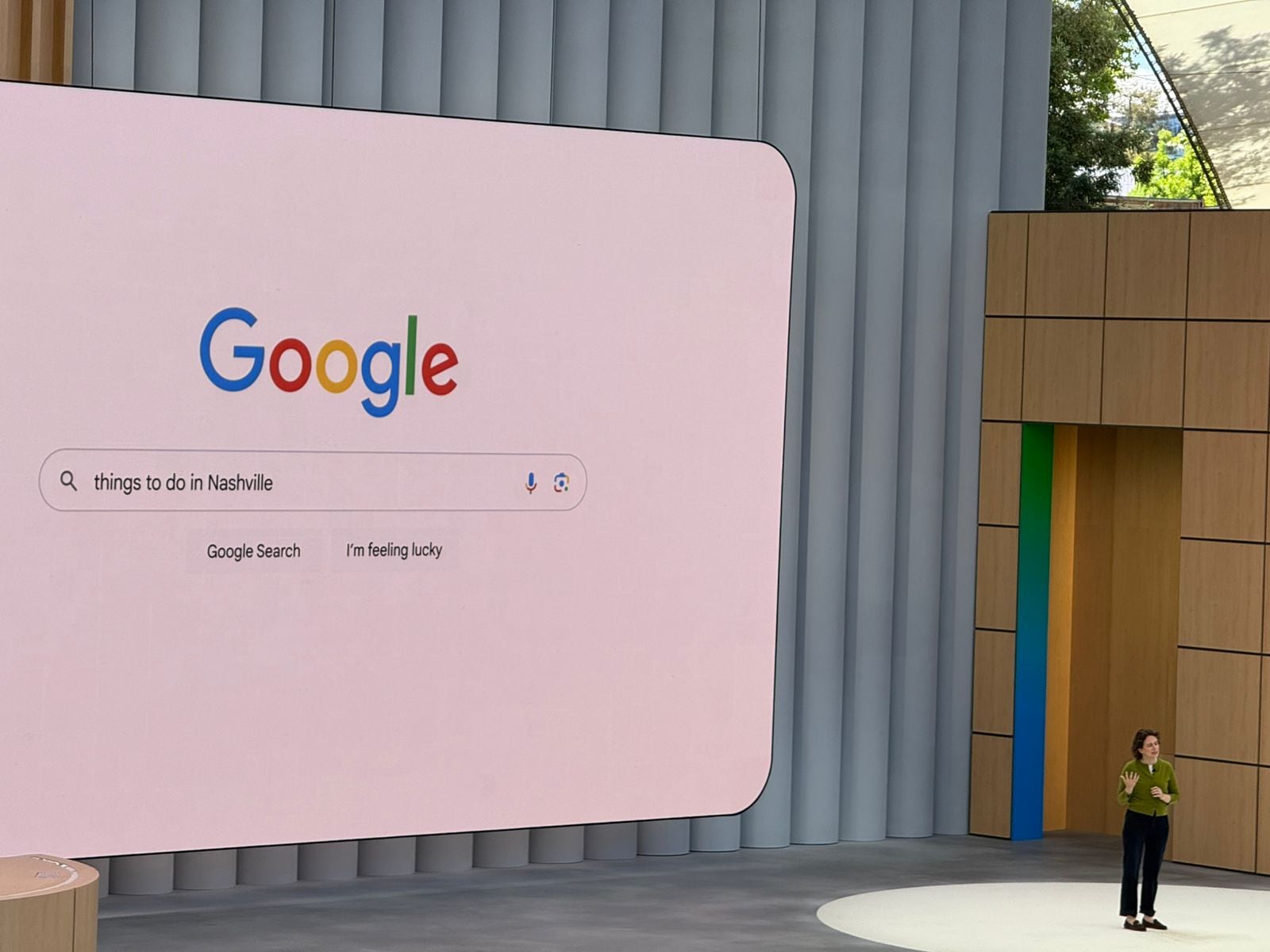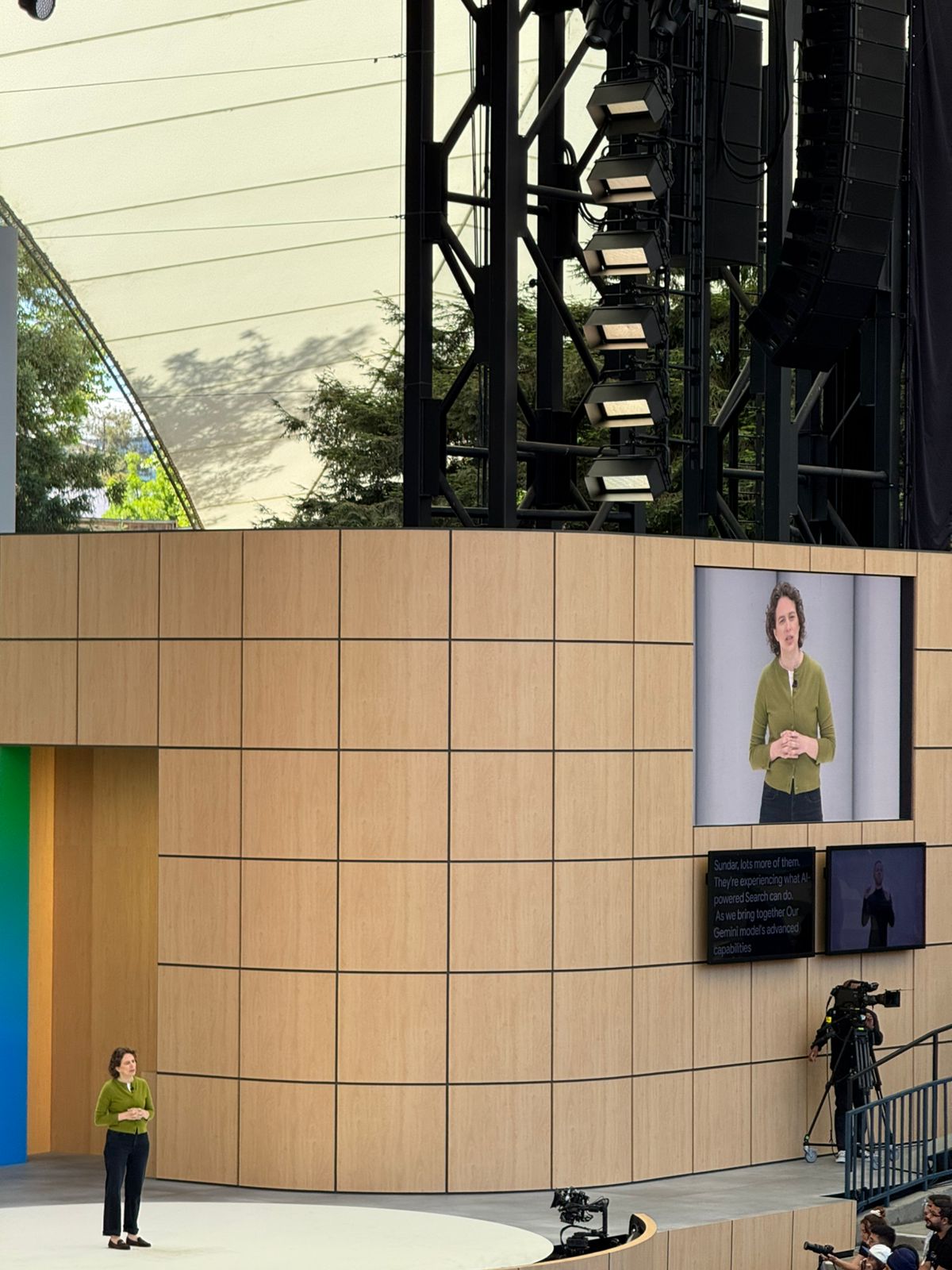Google Search is being reimagined for the AI era. As the curiosity engine of the world changes itself to take on changing user needs and challenges of new incumbents, Nandagopal Rajan spoke to Elizabeth Reid, VP, Head of Google Search, on the sidelines of Google I/O about the changing search landscape, AI Overviews and its impact on online business, as the new AI Mode being launched this week. Edited excerpts from the interview:
IE: What are the behavioural changes you are seeing in users in times of AI overviews?
Reid: We are seeing a couple of different behaviour changes. First, people are searching more. People think of questions, but they don’t always ask them. They decide, is it worth their time? Is it going to be too hard? Is it going to work? And it’s sort of like a split second calculation. With AI Overviews, because it is answering new types of questions, people learn over time and start asking more of the questions because they have confidence they can get the response. The second thing is, we particularly see this with sort of these longer, harder questions; people will often ask more questions around how to do something. We are seeing more searching overall.
IE: We get the sense that a lot of people don’t want to do a deep dive, they just want to see the AI Overview, because that’s the gist of what they were looking for. Is that a realisation you have also had?
Reid: When people come in with a question, we want to make sure we give them a great response. But often they come in with the idea that they only have one question, and then, based on the response, they get intrigued to learn more. So they might dive in deeper on a web page, or they might decide they are going to ask another question accordingly. We see that the clicks to web pages when AI Overviews exist are of higher quality. People spend more time on these pages and engage more. They are expressing higher satisfaction with the responses when we show the AI Overviews. But the ultimate test is, are you willing to pick up your phone an extra time today to ask a question? And so that’s really great to see.

 Elizabeth Reid, VP and head of Google Search, onstage at I/O 2025. (Image: Nandagopal Rajan/The Indian Express)
Elizabeth Reid, VP and head of Google Search, onstage at I/O 2025. (Image: Nandagopal Rajan/The Indian Express)
IE: As you are re-imagining search, are you seeing a positive or negative change in the business models, because a lot of online is dependent on search.
Reid: AI Overviews are designed to be part of the main search experience, and our proven business model there has really continued to work. At this point, AI Overviews is used by over 1.5 billion users each month, and our queries continue to grow and our revenue continues to grow. And as we look to AI Mode, we have confidence that that business model can continue. I think the ads will get more relevant and the websites we be more hyper relevant. People will ask more specific questions. But then there’s still a lot of choice, and when there are lot of choices, there continues to be an opportunity for ads, and we’re looking forward to starting to test that in AI Mode. But first we wanted to get the product right.
Story continues below this ad
IE: AI Overviews for a specific query, is that getting better each time, or is it almost always the same?
Reid: We have made a lot of advancements since we rolled it out a year ago. It can get better with an upgrade in the model — we are talking about rolling out Gemini 2.5 more; but within it, we continue to fine tune it. We have raters who help us understand how to improve the factuality, how to improve the helpfulness. Bringing in new features like when are images relevant add to the usefulness of the response. Speed is really paramount. We talked today about how AI Overviews are the fastest AI responses, because in search, people expect a very quick response. We know if we take too long, people get annoyed, and they don’t search as much. So speed has been something we have also been laser focused on, and has been getting better over time.
IE: Is Deep Search a response to how users are maybe moving to AI platforms for a lot of their queries? Have you been a bit late to this game?
Reid: Deep Search is really a recognition that there’s this trade off on how thorough you want the response to be based on your needs. So AI Mode, in general, will take a question, it will break it up into different topics, it will issue a bunch of search queries and that’s great for a lot of use cases. If, however, you are doing something that you really would have spent like hours of research on, you are willing to wait more than a few seconds, so you can get sort of a more in depth response. So we have seen a lot of positive feedback, in general, with Deep Research in Gemini, and that ability to go deeper and really give a thoughtful response. So we are bringing those capabilities into AI Mode.
Story continues below this ad
IE: Is AI Mode going to be the home for all AI in search, or would you have AI Overviews with your regular search as it is now?
Reid: We expect most people will still continue to interact with AI through AI Overviews. AI Overviews isn’t going away, Search is still going to be the place to come for most of your queries. AI Mode is for when you have a harder question, or you want to ask lots of follow up questions, you feel like your question really needs the cutting edge model.
IE: Is SEO dead?
Reid: People have many different interpretations of SEO. Are you producing really high quality content for people? Do you create great websites that people will love reading? That is the best SEO, right? Because ultimately if you want people to come to your site, you should produce content that people want to read. And so that form of good SEO still continues. It’s still about that sense of producing content where you have original commentary, the interesting perspective, you have gone in depth, then people who want to continue to read them.
 Google I/O 2025 opening keynote was held in Mountain View, California, US on May 20. (Image: Nandagopal Rajan/The Indian Express)
Google I/O 2025 opening keynote was held in Mountain View, California, US on May 20. (Image: Nandagopal Rajan/The Indian Express)
IE: Is there a need for websites, publishers, news to sort of start optimising for the AI era? Or is the AI models good enough to scan through good content and figure out what’s best and what to push into the readers?
Story continues below this ad
Reid: More than thinking about the AI, I would think of it as evolving to meet people’s expectations. What do they really want? They want more of that authentic story. They often care about images or videos or other ways and not a lot of text, and sometimes they want those experiences. So you should optimise for why would somebody want to go to your website? And that that’s really the focus… building great content for people.
IE: In the keynote, there was mention about SynthID, but is there a fear that a lot of the queries or the answers that are coming up with search could actually be generated by AI in the not so distant future, and then you go into this virtual cycle of AI Overviews running on top of AI content.
Reid: What really matters is the content quality. Images are a great place for AI generation as it allows you to bring your vision to life. But if you are trying to do something that looks like it’s masking reality, and then that’s not as useful, right? And so the way we think about AI in search is that we want creators and website to produce high quality content, and AI can be a great tool for them, but you should use it as a tool to produce great quality content. If AI creates spam, then we will continue as we have worked for years to ensure that the amount of spam that gets through on search is very small — less than 1% — and we will continue to focus on that.
IE: So you mentioned today that AI Overviews are now coming to more languages. Is the capability of AI Overviews in the newer languages similar to what it is in English? Or is is that going to happen on a lesser percentage of queries.
Story continues below this ad
Reid: It really depends on the language itself. In terms of the percent of queries, the bar that we use for when we show is this combination of how high quality is the AI response and how much value add does it have with the rest of the page. So in some places, it can actually show up more than in the US, because perhaps the amount of content on the web in that language was smaller to begin with, and so then it may be adding more value. AI Overviews can help you with questions for which the content is in a different language than the language you ask that question in. It can also be affected by the types of questions you ask. If you have a country where they are asking a lot of questions that really benefit from the overview, then you’ll get more. If you have a country that’s doing a lot of searching for a website by name and then you are going to have less.
If you go back to the mission, it was this idea that information should be universally accessible. It doesn’t say, as long as you speak the language. Now, with AI Overviews, you can ask the question in your language. We can find content in other languages, respond to you in a way that you understand in your language and then give you a link to those websites. Now those websites might be in another language, but if you click through with Google Translate, you can still go to the original content, but see it translated in your language. So I think that’s exciting about AI, that it breaks down a bunch of the language barriers.
IE: Is there any change in your stand that news is not where you would want AI Overviews?
Reid: Our general strategy for AI Overviews is that they should be extremely high quality, and so we have done less on hard news at the start, because we think that freshness and accuracy is really important in a lot of those cases. So we want to ensure that if you were ever to go there, that you can rely on AI Overviews. And so that’s why we have started without news. We have great things on that page that are meeting people’s needs.
Story continues below this ad
IE: Across the world, publishers are seeing a huge dip in their traffic coming from Search because of AI Overviews. Is that a phase, or is that the future?
Reid: There are many studies, we should be careful with that data. We want to ensure that AI Overviews allows people to continue to connect to websites and we are seeing a greater diversity of websites that people are clicking through. Maybe before that the query only went to one site, but now we are able to surface new sites, and clicks are going to a bunch of different sites, and those clicks are really of high quality.
The author is in California on the invite of Google.


